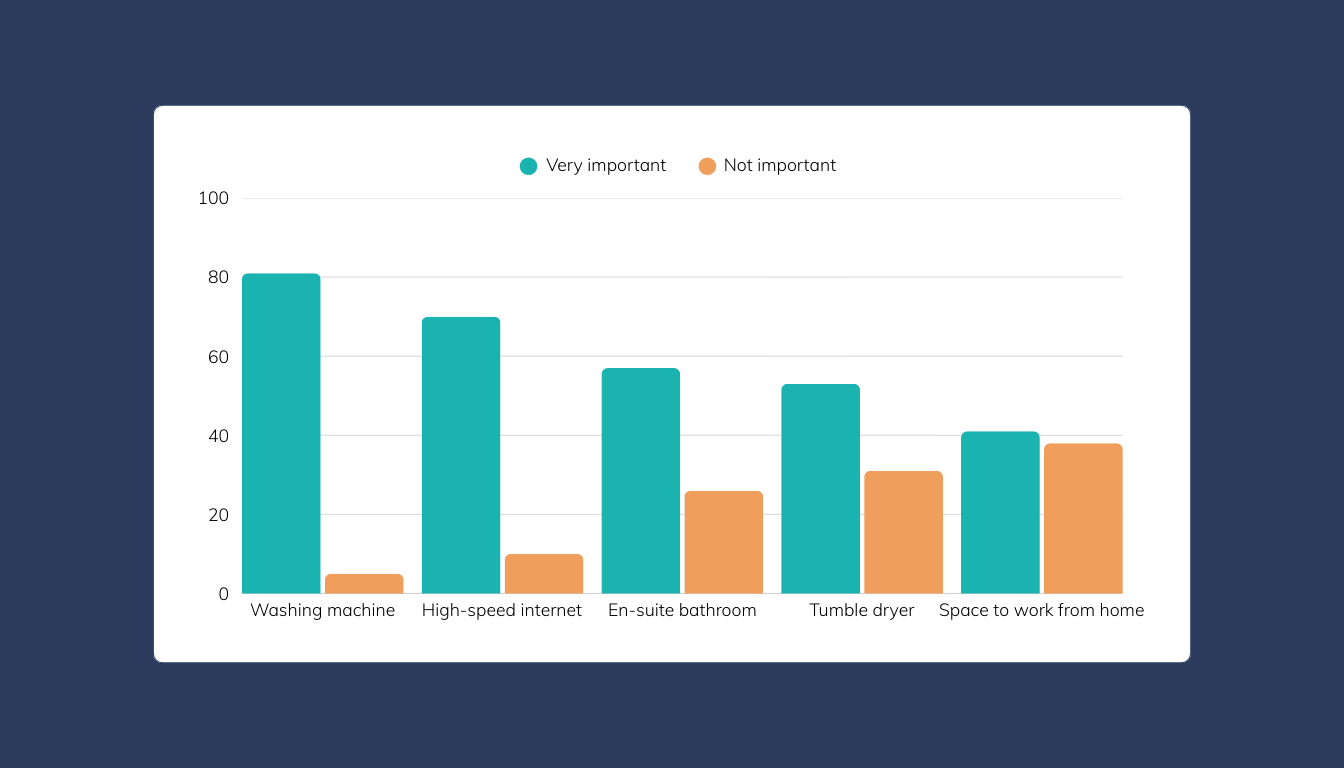Retaining tenants is one of the biggest challenges in shared living. From maintenance delays to unclear responsibilities, small issues often push tenants to leave sooner than expected. Our tenant survey reveals exactly what makes tenants stay, what drives them away, and where property managers can make the biggest difference.
Property management sets the tone
The role of the landlord or agent shapes the whole experience. From how supported tenants feel, to how efficiently disputes are handled.
85% of tenants said a bad property manager could make them want to leave sooner.
More tenants said they would leave over a bad property manager than a bad housemate.
While most tenants said they understood their responsibilities in the house, nearly 40% said some things were unclear. That confusion leads to tension, especially around cleaning, shared tasks or maintenance.
When tenants feel like the property is being looked after, they are more likely to stay and take care of it. When expectations are clear, and issues are dealt with quickly, the tone of the household improves.
Poor management breaks down relationships
If something breaks, tenants expect it to be fixed quickly.
87% of tenants said slow maintenance fixes would make them want to leave sooner.
The problem is often not the repair itself, but the lack of response. When maintenance is delayed, ignored or passed around, it undermines trust and leaves tenants feeling overlooked.
Managers who prioritise quick, transparent fixes, and use systems to stay on top of issues, are more likely to retain tenants and avoid costly voids.
Three simple ways to keep maintenance on track:
- Set clear expectations about how long fixes typically take.
- Use one system to log and manage all issues.
- Close the loop by confirming when an issue has been resolved.
Clean homes are harder to walk away from
Cleanliness was the most common challenge tenants faced, rated above noise, privacy and clashing personalities.
27% of tenants cited hygiene or cleanliness as the biggest issue in shared homes.
40% said they were unclear about who was responsible for cleaning and maintenance tasks.
Uncertainty about responsibilities fuels frustration and conflict. For property managers, the message is clear: standards of cleanliness set the tone from day one.
Shared areas that are tidy, bins that are not overflowing, and clear expectations all make tenants more likely to stay. It is not just about presentation, it is about pride, atmosphere and retention.
Some amenities matter more than others
Tenants are not asking for luxury. They want homes that are practical, reliable and comfortable.
The most valued amenities were:
- Washing machines
- High-speed internet
- En-suite bathrooms
Lower-priority amenities included tumble dryers, TVs in bedrooms, car parking and outdoor space. These may appeal to some, but they are not key decision factors for most tenants.
The takeaway for property managers is simple: focus on the essentials that consistently influence tenant satisfaction and retention.
The right match makes tenants stay longer
You can invest in layout and amenities, but if the housemates do not get along, nothing lasts.
47% of tenants said they would pay more in rent for guaranteed compatibility.
Nearly 66% told us that knowing who their housemates are before moving in is important.
2 in 5 said they would be willing to handle viewings for a new housemate, as long as they had a say in who moved in.
Compatibility might feel like a soft factor, but its impact is significant. When housemates gel, the household atmosphere improves, and tenants are more likely to stay.
Even simple steps like adding a description of the household vibe or sharing tenant interests in listings go a long way. Helping tenants feel invested in the household dynamic reduces pressure on managers and creates longer tenancies.
Shared living works best when people feel they belong
Respect the basics, set clear expectations and focus on compatibility. That is what makes the difference between tenants who renew and those who leave.
When tenants feel supported and matched with the right household, they are more likely to stay. And when they stay, everyone benefits.
FAQs about tenant retention in shared living
What makes tenants leave shared living?
The top reasons are poor property management, slow maintenance, unclear cleaning responsibilities, and household incompatibility.
What do tenants value most in shared housing?
Practical amenities like washing machines, fast internet and en-suites consistently rank highest.
Is compatibility really that important?
Yes. 47% of tenants said they would pay more in rent for guaranteed compatibility, and 66% said knowing their housemates before moving in matters.
How can property managers improve tenant retention?
By addressing small issues quickly, setting clear expectations, maintaining cleanliness, and treating compatibility as a key part of the process.
👉 Want to see all the survey insights? Download the State of Shared Living 2025 report for the full findings.
Retaining tenants is one of the biggest challenges in shared living. From maintenance delays to unclear responsibilities, small issues often push tenants to leave sooner than expected. Our tenant survey reveals exactly what makes tenants stay, what drives them away, and where property managers can make the biggest difference.
Property management sets the tone
The role of the landlord or agent shapes the whole experience. From how supported tenants feel, to how efficiently disputes are handled.
85% of tenants said a bad property manager could make them want to leave sooner.
More tenants said they would leave over a bad property manager than a bad housemate.
While most tenants said they understood their responsibilities in the house, nearly 40% said some things were unclear. That confusion leads to tension, especially around cleaning, shared tasks or maintenance.
When tenants feel like the property is being looked after, they are more likely to stay and take care of it. When expectations are clear, and issues are dealt with quickly, the tone of the household improves.
Poor management breaks down relationships
If something breaks, tenants expect it to be fixed quickly.
87% of tenants said slow maintenance fixes would make them want to leave sooner.
The problem is often not the repair itself, but the lack of response. When maintenance is delayed, ignored or passed around, it undermines trust and leaves tenants feeling overlooked.
Managers who prioritise quick, transparent fixes, and use systems to stay on top of issues, are more likely to retain tenants and avoid costly voids.
Three simple ways to keep maintenance on track:
- Set clear expectations about how long fixes typically take.
- Use one system to log and manage all issues.
- Close the loop by confirming when an issue has been resolved.
Clean homes are harder to walk away from
Cleanliness was the most common challenge tenants faced, rated above noise, privacy and clashing personalities.
27% of tenants cited hygiene or cleanliness as the biggest issue in shared homes.
40% said they were unclear about who was responsible for cleaning and maintenance tasks.
Uncertainty about responsibilities fuels frustration and conflict. For property managers, the message is clear: standards of cleanliness set the tone from day one.
Shared areas that are tidy, bins that are not overflowing, and clear expectations all make tenants more likely to stay. It is not just about presentation, it is about pride, atmosphere and retention.
Some amenities matter more than others
Tenants are not asking for luxury. They want homes that are practical, reliable and comfortable.
The most valued amenities were:
- Washing machines
- High-speed internet
- En-suite bathrooms
Lower-priority amenities included tumble dryers, TVs in bedrooms, car parking and outdoor space. These may appeal to some, but they are not key decision factors for most tenants.
The takeaway for property managers is simple: focus on the essentials that consistently influence tenant satisfaction and retention.
The right match makes tenants stay longer
You can invest in layout and amenities, but if the housemates do not get along, nothing lasts.
47% of tenants said they would pay more in rent for guaranteed compatibility.
Nearly 66% told us that knowing who their housemates are before moving in is important.
2 in 5 said they would be willing to handle viewings for a new housemate, as long as they had a say in who moved in.
Compatibility might feel like a soft factor, but its impact is significant. When housemates gel, the household atmosphere improves, and tenants are more likely to stay.
Even simple steps like adding a description of the household vibe or sharing tenant interests in listings go a long way. Helping tenants feel invested in the household dynamic reduces pressure on managers and creates longer tenancies.
Shared living works best when people feel they belong
Respect the basics, set clear expectations and focus on compatibility. That is what makes the difference between tenants who renew and those who leave.
When tenants feel supported and matched with the right household, they are more likely to stay. And when they stay, everyone benefits.
FAQs about tenant retention in shared living
What makes tenants leave shared living?
The top reasons are poor property management, slow maintenance, unclear cleaning responsibilities, and household incompatibility.
What do tenants value most in shared housing?
Practical amenities like washing machines, fast internet and en-suites consistently rank highest.
Is compatibility really that important?
Yes. 47% of tenants said they would pay more in rent for guaranteed compatibility, and 66% said knowing their housemates before moving in matters.
How can property managers improve tenant retention?
By addressing small issues quickly, setting clear expectations, maintaining cleanliness, and treating compatibility as a key part of the process.
👉 Want to see all the survey insights? Download the State of Shared Living 2025 report for the full findings.








